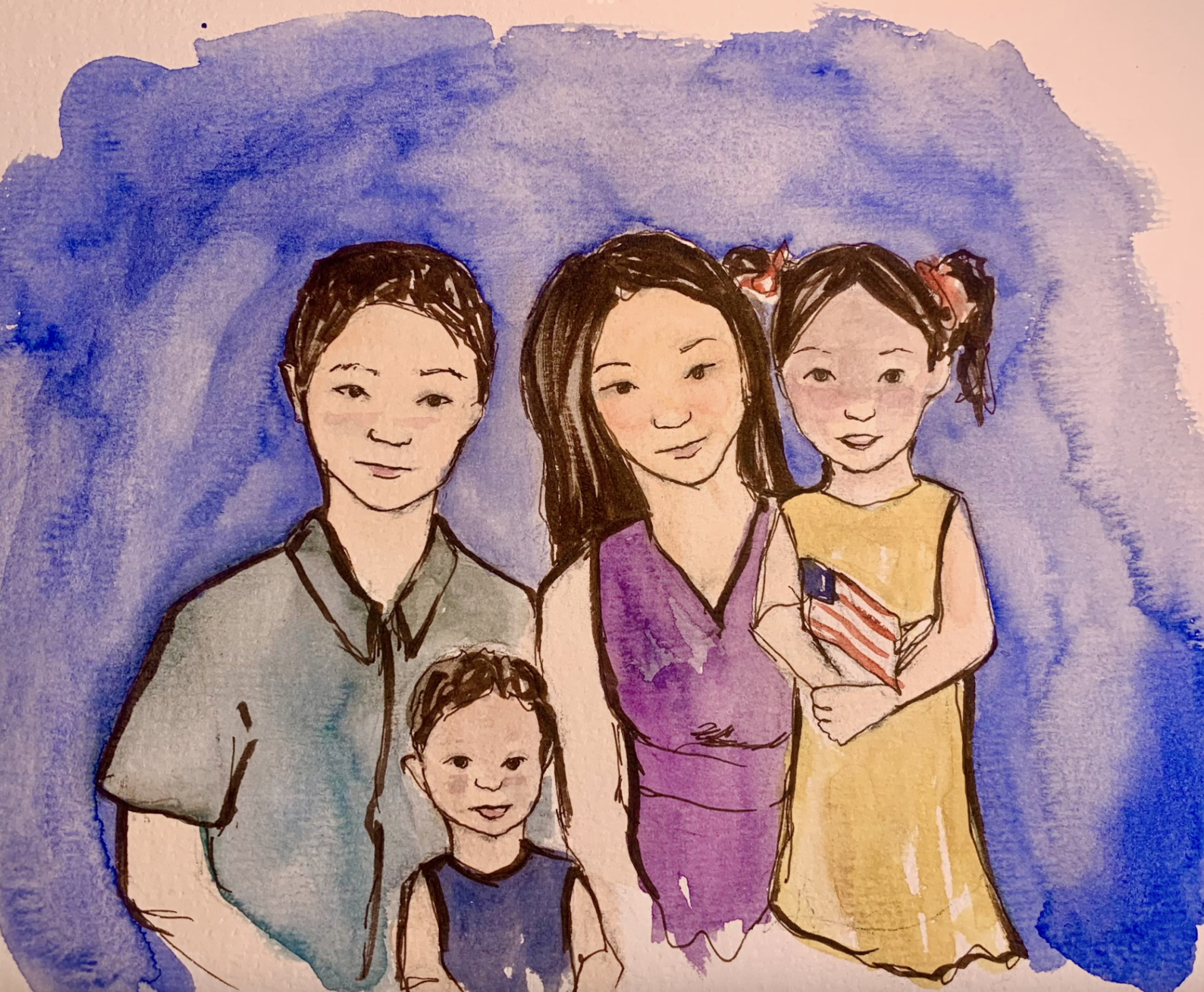
Illustration by Anna Chamberlin
I knew planes well enough during pre-COVID days. My family always made it a point to visit my grandparents in Shanghai each summer, a ritual of 14-hour flights and layovers in glass-enclosed airports.
I remember most parts of the trips: the jingle of US customs advertisements, the line dividers, the scratched metal seat buckles, the strangeness of being in the air. The sun sank and colored the clouds. The third-row baby usually cried, keeping time with the thumps of turbulence that rocked the cabin. On the screen, the animated plane would tilt to the edge of the horizon, inching its way across one time zone and into the next. 30,000 feet above the Arctic ocean and 500 miles away from the furthest coastline, I sometimes imagined the version of myself that America would have wanted.
His hair would be softer, still dense, but supple enough to tame into styles other than straight-line buzz-cuts. He probably wouldn’t have to repeat his name three times on the first day of school or in DMV lines. He would be spared the mildly awkward exercise of asking his friends to take off their shoes at the doorstep. He would’ve made the freshman basketball team rather than wilting on the hardwood court. He would carry on the dry talk without the hem-hawing or fidgeting.
It’s hard to describe the second-generation Asian-American experience. Part of it is about growing up surrounded by the hallmarks of American life—to be aware of what quintessential America looks like—but only seeing them from the outside. I read Encyclopedia Brown, Flat Stanley, and Judy Blume’s Fudge series, books with protagonists whose inside jokes and family traditions looked almost nothing like mine. I drifted around the short-lived fads of my peers, from Pokémon cards to Silly Bandz and Rainbow Loom. I never attended Chinese school, and I lived among neighbors who patronized private swimming pools, hosted book clubs, attended church retreats, and barbecued most summer evenings instead. I’m American enough to know what mainstream America looks like, to know that it’s often what I’m not.
But I touch down in an airport with only hot water dispensers and signs that have become harder to read. Shanghai has its own set of customs and cultural terrain for me to navigate: the tea I end up declining after each meal, the billboards incomprehensible to my preschool levels of literacy, the grammatical blunders in my everyday conversation that betray a naïve Americanness. The teenagers on the subway whisper to each other about trends I don’t know. My restaurant visits follow the embarrassingly inevitable storyline of having to explain that, no, I don’t eat chicken feet, beef tripe, or pate, before shamefully asking for a Gringo fare of fried rice instead. Perhaps the only thing stranger than my placement of prepositions might be the hope of belonging to a city I have never spent more than a few weeks in at a time.
Being a second-generation Chinese-American, then, means finding yourself in a state of in-betweenness, indeterminacy and suspension. You learn to look in from the outside. You sit with that mix of kinship and alienation, belonging and unfamiliarity. It’s the same feeling that W.E.B. DuBois probably meant when he described that “peculiar sensation” of double-consciousness.
My parents have called America home for the better part of their lives. They frequent the Panda Express by the Milford rest stop on the way to pick me up, and they like to play The Beatles on the road. And yet, I think a part of them never fully assimilated: they ended up with a son who would hum along to the tunes of 1980s Chinese folk-rock ballads and never quite catch up with Star Wars, vaguely follow Chinese sitcoms yet struggle with chopsticks to this day, gawk at restaurant fish tanks, pour cold milk over Frosted Flakes and collect red pockets come every February. We talk about the transplants but never the offshoots that spring from them, the messy mix of cravings, paths, and stories that we don’t quite have a word for yet.
At this point I’d usually be passing through some unnamed stretch of Siberia, somewhere halfway, hyphenated, and unknown. Stretched out across two different homes, in two different worlds, and yet never quite being anywhere at all.







